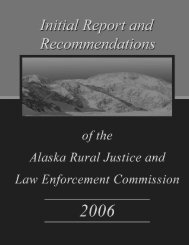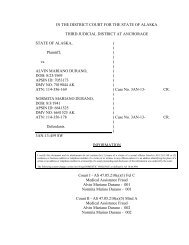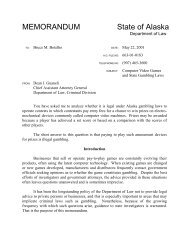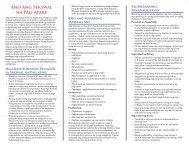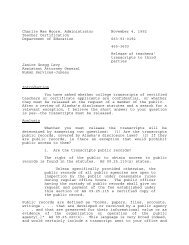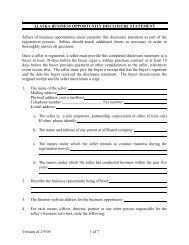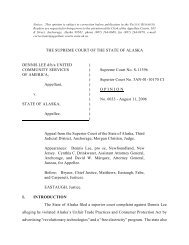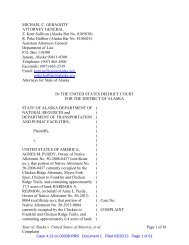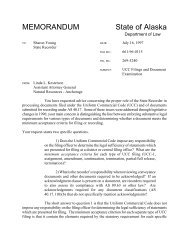Victims' Rights Handbook - Alaska Department of Law - State of Alaska
Victims' Rights Handbook - Alaska Department of Law - State of Alaska
Victims' Rights Handbook - Alaska Department of Law - State of Alaska
- No tags were found...
You also want an ePaper? Increase the reach of your titles
YUMPU automatically turns print PDFs into web optimized ePapers that Google loves.
<strong>Alaska</strong> Victims’ <strong>Rights</strong> <strong>Handbook</strong>violence crimes are entitled to automatic notification<strong>of</strong> escape. Upon request after a conviction <strong>of</strong> thedefendant, a victim is entitled to information from theprosecutor about the defendant’s complete convictionhistory. For notification, victims must maintain acurrent address with the <strong>Department</strong> <strong>of</strong> Correction[AS 33.30.013(a)-(c ); AS 12.61.015(a)(3), AS12.61.010(a)(2), AS 33.30.013; AS 12.61.010(a)(10)].Defendants convicted <strong>of</strong> misdemeanor crimes arenot supervised while on probation but defendantsconvicted <strong>of</strong> felony crimes are supervised by the<strong>Department</strong> <strong>of</strong> Corrections. A defendant who violatesprobation may be brought back before the court on aPetition to Revoke Probation. Under the Victim <strong>Rights</strong>Act, the victim has the right to notice and opportunityto speak at any probation revocation proceedinginvolving conditions <strong>of</strong> release or sentencing(called “disposition” in probation proceedings).Victims’ <strong>Rights</strong> Pertaining to Post-Sentencing ModificationsVictims are entitled to address the court at adefendant’s request to modify or reduce their sentence.Upon request and providing address informationto the <strong>Department</strong> <strong>of</strong> Correction, the <strong>Department</strong>shall provide notice <strong>of</strong> the prisoner’s request andsend the victim a copy <strong>of</strong> any motions to modify orreduce sentence and inform the person <strong>of</strong> his or her:• <strong>Rights</strong> under this section;• The deadline for receipt <strong>of</strong> written comments; and• The hearing date and the court’s address.Victims must update the <strong>Department</strong> <strong>of</strong>Corrections with address information.Upon request, the <strong>Department</strong> <strong>of</strong> Corrections shallnotify the victim <strong>of</strong> hearings to consider or reviewdiscretionary parole. Victims must notify the ParoleBoard <strong>of</strong> their address information. Victims maywrite to the Parole Board or attending the hearing.Before granting probation to persons convicted <strong>of</strong>domestic violence, the court shall consider the safetyand protection <strong>of</strong> the victim and any member <strong>of</strong> thevictim’s family. The court may impose any otherconditions <strong>of</strong> probation necessary to protect thevictim and any members <strong>of</strong> the victim’s family or torehabilitate the defendant. If the victim has specificconcerns or requests for probation conditions, thevictim should contact the District Attorneys’ Office inadvance <strong>of</strong> the sentencing [AS 12.55.088(d)(e) and(h); AS 12.61.010(a); AS 33.16.120; AS 12.55.101(a)].Victims’ <strong>Rights</strong> and Executive ClemencyIn 2007 legislation was passed which requires thegovernor to refer applications for executive clemency(including pardons) to the state parole board atleast 120 days prior to any grant <strong>of</strong> clemency. Theparole board is required to notify the <strong>Department</strong> <strong>of</strong><strong>Law</strong>, the Office <strong>of</strong> Victims’ <strong>Rights</strong> and the victim <strong>of</strong> acrime involving domestic violence, arson in the firstdegree, or a crime against a person. Crimes againsta person include homicides, assaults, sexual <strong>of</strong>fensesand all other crimes set forth in title 11, chapter 41 <strong>of</strong>the <strong>Alaska</strong> statutes. This legislation (House Bill 69)was sponsored by Anchorage Representative RalphSamuels and was signed into law by former GovernorSarah Palin on February 22, 2007 [AS 33.20.080(a)].Access to <strong>Law</strong> Enforcement Records<strong>Alaska</strong>’s public record law states that “unlessspecifically provided otherwise, the public records<strong>of</strong> all public agencies are open to inspection bythe public…” There are a number <strong>of</strong> exceptionsto the general rule and one <strong>of</strong> those exceptionsapplies to “records or information compiled for lawenforcement purposes…” This exception protectsfrom disclosure the production <strong>of</strong> informationthat could reasonably be expected to interfere withenforcement proceedings, deprive a person <strong>of</strong> a fairtrial or impartial adjudication, to name just a fewexamples. This same provision also protects fromdisclosure <strong>of</strong> information that “could reasonablybe expected to constitute an unwarranted invasion<strong>of</strong> the personal privacy <strong>of</strong> a…victim, or witness,”[AS 40.25.110(a); 12o(a)(6) and (a)(6)(C)].Victims’ <strong>Rights</strong> in Juvenile Justice CasesOne <strong>of</strong> the goals <strong>of</strong> the Juvenile Justice Systemis to ensure that victims <strong>of</strong> crimes committed byjuveniles are afforded the same rights as victims <strong>of</strong>crimes committed by adults [AS 47.12.010(b)(12)].So victims generally have the same legal rights andshould refer to the rights outlined above. But the7



